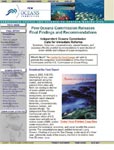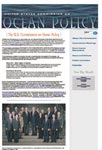In the 21st century, as it is necessary for us not only to pursue the development of the economy and technology, but also to coexist with the global environment, a restructuring of ethics is required with regard to the world's food problems. FAO (Food and Agriculture Organization), which has addressed the world's food and agricultural problems as a specialized agency of the United Nations, has been grappling with "the ethics in food and agriculture" aiming at actual food security in the future for humankind. An effort has been started in the Fisheries Department to address ethical issues in fisheries.
Selected Papers No.6
- Top
- Publications
- Ocean Newsletter
- Comprehensive reappraisal of the U.S. ocean policy is underway
Ocean Newsletter
No.84 February 5, 2004
-
FAO and "Ethics in Fisheries"
Hiromoto Watanabe
Fisheries Department, FAO
Selected Papers No.6 -
My thoughts about canals - On a visit to canals in the UK -
Kei Tanaka
Director-General, Japan Ship Centre (JETRO)Canals were the backbone of the Industrial Revolution in the UK, but they should no be regarded as historic relics. Even today, they are still in service for freight transportation, and are being redeveloped into new waterfront leisure sites. Hundreds of volunteers participate in projects to maintain and restore these traditional waterways, and the UK government provides financial support of 80 million pounds (approximately 16 billion yen) each year for these projects. Isn't it possible for Japan to revive canals and take advantage of their leisure potential instead of treating them as an obsolete transport infrastructure that should be abandoned? -
Comprehensive reappraisal of the U.S. ocean policy is underway
Donald F. Boesch
President, University of Maryland Center for Environmental Science
Selected Papers No.6In the U.S., recommendations are being made for a historic change in its ocean policy. The Pew Oceans Commission, a private organization, has already released a report, and the presidentially-appointed U.S. Commission on Ocean Policy plans to release a report early in 2004. Both the reports put emphasis on ocean management and sustainable resource utilization, and propose extensive reformations of the administrative organizations, etc. It is uncertain to what extent the recommendations might be implemented, however, significant changes in the U.S. ocean policy are expected.
Selected Papers No.6
Comprehensive reappraisal of the U.S. ocean policy is underway
Abstract:Two national commissions are making recommendations for redirecting United States ocean policy. The privately-supported Pew Oceans Commission has already released its report and the Presidentially-appointed U.S. Commission on Ocean Policy will issue a report in early 2004. While the scope and political perspectives of these commissions differ, their key recommendations will nonetheless stress stewardship and sustainable resource use. The commissions identify the need for improved ocean governance through coordination across federal agencies and vertically through national, state and local government. They endorse ecosystem-based management of fisheries and other human activities and watershed-based approaches for managing land-based activities that affect the coasts and oceans. The commissions recommend doubling of the U.S. investment in ocean science and technology and particularly in an Integrated Ocean Observing System. Finally, the commissions also stress the importance of education of the public about the ocean, including how humans affect the ocean and how the ocean affects out lives. Although the degree to which the commission recommendations will be implemented is uncertain because of the dominance of economic, social and national security issues in this election year, the two commission reports present an unprecedented impetus for significant changes in U.S. ocean policy.Early in 2004, the United States Commission on Ocean Policy will issue its long awaited report to the President and Congress as mandated by the Oceans Act of 2000. The Commission undertook the first comprehensive reconsideration of U.S. policies related to the ocean since the Stratton Commission released its landmark report “Our Nation and the Sea” in 1969. Chaired by retired Admiral James D. Watkins, former Chief of Naval Operations and Secretary of Energy, the Commission consists of 16 distinguished individuals appointed by President Bush and held fact-finding meetings throughout the U.S. during 2001-2002.
In May, 2003, the Pew Oceans Commission (http://www.pewoceans.org/) released its own report making recommendations for a new U.S. ocean policy. The Pew Commission had a somewhat narrower focus than the U.S. Commission, concentrating on living resources, including the fisheries and natural biodiversity of American seas. This non-governmental commission was sponsored by a private foundation prior to the passage of the Oceans Act of 2000 and was chaired by former Congressman and White House Chief of Staff Leon Panetta.
Although the Pew Commission is perceived to have a more activist agenda particularly with regard to fisheries management and marine reserves, presentations made by Admiral Watkins and other members of the U.S. Commission suggest that there will be many similarities in the key recommendations of the two commissions that will undoubtedly influence future U.S. ocean policies. While the earlier Stratton Commission saw the ocean as a vast frontier to explore and exploit, the present commissions very much emphasize the limits of the oceans and the urgent need to protect and sustain their finite resources.
The U.S. Commission will recommend a new model for ocean governance that will seek to align and coordinate the many disparate, confusing and singe-issue governance tools. It will recommend an integrated structure that: (1) treats ocean resources as parts of ecosystems and uses proactive, adaptive management methods; (2) is based on principles of stewardship incorporated through private-public partnerships; (3) integrates government structure both horizontally (across agencies) and vertically (federal to state to local); and (4) enables more consistent participation by stakeholders and experts. The U.S. Commission will recommend a high level National Ocean Council to better organize and coordinate national efforts. The Pew Commission also called for a permanent interagency Ocean Council, but goes further to recommend an independent oceans agency.
Both Councils will strongly endorse adoption of ecosystem-based strategies to improve management of fisheries and other human uses of the coasts and ocean. The U.S. Commission recognizes that application of ecosystem-based management will require defining geographic management areas based on ecosystem, rather than political, boundaries. The Pew Commission goes further in calling for Regional Ocean Ecosystem Councils and a national system of marine reserves. It also recognizes that because of the limits of natural fishery resources there will be increased reliance on aquaculture, but argues that marine aquaculture must be environmentally compatible and sustainable.
Both commissions will note that while considerable progress has been made in controlling ocean pollution, major challenges remain, particularly with regard to nonpoint source pollution by nutrients and toxic contaminants. Both commissions will also stress the need to better manage the rapid population growth and development of U.S. coastal areas, including nonpoint source pollution and damage to critical habitats. More effective governance mechanisms and redirection of governmental programs and subsidies away from harmful coastal sprawl development and toward beneficial development and restoration will be required. Interestingly, both with regard to nonpoint source development and land development, the commissions both will emphasize the need to align national policies regarding agriculture, energy consumption, air quality, transportation, and other land-based activities with national ocean policy. Management of coastal zones and seas must include a watershed perspective. “The Gulf of Mexico begins in Minnesota,” Admiral Watkins is fond of saying. The U.S. Ocean Commission will make a strong case for a significant increase in the national investment in science and technology. It notes that the federal investment of approximately $650 million annually on basic and applied ocean research has remained stagnant for the past 20 years when adjusted for inflation. Federal ocean R&D has decreased from 7 percent of the total R&D budget in 1982 to about 3.5 percent today. Both commissions, in fact, will call for a doubling of U.S. ocean science and technology funding. While both commissions stress the need for environmental monitoring and ocean observations, the U.S. Commission is expected to advance a very strong endorsement of a sustained, Integrated Ocean Observing System (IOOS). The U.S. IOOS would integrated a network of regional coastal observing systems that serve local ecosystem-based management needs and diverse users with the global observations made by U.S. agencies for weather forecasting and climate assessment. The U.S. IOOS would also serve as the link with the many contributing international partners in the Global Ocean Observing System (GOOS).
Both the U.S. and the Pew commissions will also stress the importance of ocean education at all levels in order to improve the understanding and appreciation of the ocean by American citizens and to the train the next generation of scientists and managers needed for effective ecosystem-based stewardship of ocean resources. Both commissions see the need for greater ocean literacy as a requirement for the broad public support required for restoring and sustaining the oceans. The U.S. Commission, for example, is crafting recommendations for training school teachers in ocean science, incorporating ocean science into national education standards, fostering better communication between educators and scientists, capitalizing on ocean exploration as an inspirational tool, and enhancing informal education through marine aquaria, zoos and museums.
The two commission reports are the most thorough and comprehensive reassessments of ocean policy ever undertaken, certainly in the United States and perhaps in the world. Although 2004 is an election year in the United States and citizens and political leaders are focused on other important economic, social and national security issues, the reports will certainly have major influence on national ocean policy. Congressional actions on many important elements of the policy, including reauthorization of federal fishery management statutes, are on hold pending the release of the report of the U.S. Commission on Ocean Policy. Furthermore, the reports will undoubtedly provide many recommendations that will be implemented during the next Presidential term of office.
Dr. Donald F. Boesch is President of the University of Maryland Center for Environmental Science. He served both as a member of the Scientific Advisory Panel for the U.S. Commission and as a technical consultant to the Pew Oceans Commission.
Dr. Donald F. Boesch is President of the University of Maryland Center for Environmental Science. He served both as a member of the Scientific Advisory Panel for the U.S. Commission and as a technical consultant to the Pew Oceans Commission



